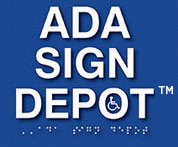How Do I Interact with a Blind or Visually Impaired Person?
ADA Sign Depot
December 09, 2013

How Do I Interact with a Blind or Visually Impaired Person?
United Spinal Association’s
I am a visually impaired person. Soon after graduating from Purdue University West Lafayette, I lost a significant amount of my vision due to a disease known as rod-cone dystrophy. Although I have been legally blind now for nearly 40 years, my circumstance has not deterred me from enjoying and participating in many of the same activities as a person with sight would experience.
Although adapting to blindness has been both frustrating and challenging, I have found much success when I focus on the things I can do as opposed to those that I cannot do. Choosing this positive and realistic attitude enables me to live and work as normal as any of my sighted friends, family and business colleagues.
I am happily married, and my wife, Lexi, and I live a comfortable and contended life. Lexi is my closest confidant. I rely on her for anything from help with my daily activities to assisting me with critical business decisions with my company.
I am the founder and president of The Ross Group in Portage, a diversified commercial construction firm. I am proud of the accomplishments of my associates and the good reputation we have earned.
I do not consider having a disability to be a sign of weakness or impairment. I embrace my abilities to “read people” and to make decisions using nonconventional approaches.
Are there challenges for me? Of course, but I have learned to rely on the compassion, care and expertise of others to help me to meet them. I am a person created by God who will hopefully inspire others to do great things.
Often, people do not know how to interact with a visually impaired person. The following list was created by an organization known as Sightcare, and I hope it will be helpful to you.
- Do go up and introduce yourself to the person and speak directly to him/her.
- Do feel free to take photographs of the person.
- Do offer your arm for assistance.
- Do let the person know when you are leaving a room.
- Do use high-contrast items like black and white when possible (example: place settings for meals).
- Do use the clock method when telling the person where food and other items are located.
- Do remember vision can be affected by weather conditions (it might be easier to see on cloudy days).
- Don’t shout when speaking to the person or use hand gestures when talking.
- Don’t leave out words like “see” and “look” when talking to the person.
- Don’t fill glasses or cups to the top.
- Don’t leave the person standing alone in an open space.
- Don’t move personal items or rearrange furniture or leave cabinet or closet doors partially open.
I consider National Disabilities Awareness Month to be a time to celebrate. Every person contributes something special to this world, and we should all embrace ourselves and each other for being exactly who we are.
Ross Pangere is president of The Ross Group in Portage. The opinions are the writer’s.
- Tags: ADA People Subscribe to this blog's RSS feed.


